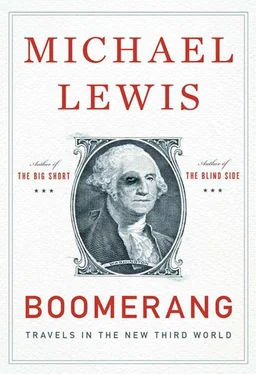Cesar draws me a little map to use to get to Vatopaidi and gives me a more general lay of the land. The mere fact that I don’t have a beard will expose me as a not terribly holy man, he explains, if my mauve Brooks Brothers shirt doesn’t do it first. “But they are used to having visitors,” he said, “so it shouldn’t be a problem.” Then he pauses and asks, “But what is your religion?”
“I don’t have one.”
“But you believe in God?”
“No.”
He thinks this over.
“Then I’m pretty sure they can’t let you in.”
He lets the thought sink in. “On the other hand, how much worse could it get for you?” he says, and chuckles.
An hour later I’m walking off the ferry holding nothing but the Eagles Palace hotel laundry bag and Cesar’s little map, and he’s still repeating his own punch line—“How much worse could it get for you?”—and laughing more loudly each time.
The monk who meets me at Vatopaidi’s front gate glances at the laundry bag and hands me a form to fill in. An hour later, having pretended to settle into my surprisingly comfortable cell, I’m carried by a river of bearded monks through the church door. Fearing that I might be tossed out of the monastery before I got a sense of the place, I do what I can to fit in. I follow the monks into their church; I light candles and jam them into a tiny sandpit; I cross myself incessantly; I air-kiss the icons. No one seems to care one way or the other about the obviously not-Greek guy in the mauve Brooks Brothers shirt, though right through the service a fat young monk who looks a bit like Jack Black glares at me, as if I was neglecting some critical piece of instruction.
Otherwise the experience was sensational, to be recommended to anyone looking for a taste of tenth-century life. Beneath titanic polished golden chandeliers, and surrounded by freshly cleaned icons, the monks sang; the monks chanted; the monks vanished behind screens to utter strange incantations; the monks shook what sounded like sleigh bells; the monks floated by waving thuribles, leaving in their wake smoke and the ancient odor of incense. Every word that was said and sung and chanted was biblical Greek (it seemed to have something to do with Jesus Christ), but I nodded right along anyway. I stood when they stood, and sat when they sat: up and down we went like pogo sticks, for hours. The effect of the whole thing was heightened by the monks’ magnificently wild beards. Even when left to nature, beards do not all grow in the same way. There are types: the hopelessly porous mass of fuzz; the Osama bin Laden/Assyrian-king trowel; the Karl Marx bird’s nest. A surprising number of the monks resembled the Most Interesting Man in the World from the Dos Equis commercial. (“His beard alone has experienced more than a lesser man’s entire body.”)
The Vatopaidi monks have a reputation for knowing a lot more about you than you imagine they do, and for sensing what they do not know. A woman who runs one of the big Greek shipping firms told me over dinner in Athens that she had found herself seated on a flight not long ago beside Father Ephraim, the abbot of Vatopaidi (business class). “It was a very strange experience,” she said. “He knew nothing about me, but he guessed everything. My marriage. How I felt about my work. I felt that he completely knew me.” Inside their church I doubted their powers—in the middle of a great national scandal they have allowed a writer , albeit one who has not formally announced himself, to show up, bunk down, and poke around their monastery without asking the first question.
But coming out of the church I finally get seized: a roundish monk with a salt-and-pepper beard and skin the color of a brown olive corners me. He introduces himself as Father Arsenios.
For most of the 1980s and 1990s, Greek interest rates had run a full 10 percent higher than German ones, as Greeks were regarded as far less likely to repay a loan. There was no consumer credit in Greece: Greeks didn’t have credit cards. Greeks didn’t usually have mortgage loans, either. Of course, Greece wanted to be treated, by the financial markets, like a properly functioning Northern European country. In the late 1990s they saw their chance: get rid of their own currency and adopt the euro. To do this they needed to meet certain national targets, to prove that they were capable of good European citizenship—that they would not, in the end, run up debts that other countries in the euro area would be forced to repay. In particular they needed to show budget deficits under 3 percent of their gross domestic product, and inflation running at roughly German levels. In 2000, after a flurry of statistical manipulation, Greece hit the targets. To lower the budget deficit the Greek government moved all sorts of expenses (pensions, defense expenditures) off the books. To lower Greek inflation the government did things like freeze prices for electricity and water and other government-supplied goods, and cut taxes on gas, alcohol, and tobacco. Greek government statisticians did things like remove (high-priced) tomatoes from the consumer price index on the day inflation was measured. “We went to see the guy who created all these numbers,” a former Wall Street analyst of European economies told me. “We could not stop laughing. He explained how he took out the lemons and put in the oranges. There was a lot of massaging of the index.”
Which is to say that even at the time, some observers noted that Greek numbers never seemed to add up. A former IMF official turned economic adviser to former Greek prime minister Konstantinos Mitsotakis turned Salomon Brothers analyst named Miranda Xafa pointed out in 1998 that if you added up all the Greek budget deficits over the previous fifteen years they amounted to only half the Greek debt. That is, the amount of money the Greek government had borrowed to fund its operations was twice its declared shortfalls. “At Salomon we used to call [the then head of the Greek National Statistical Service] ‘the Magician,’” says Xafa, “because of his ability to magically make inflation, the deficit, and the debt disappear.”
In 2001, Greece entered the European Monetary Union, swapped the drachma for the euro, and acquired for its debt an implicit European (read German) guarantee. Greeks could now borrow long-term funds at roughly the same rate as Germans—not 18 percent but 5 percent. To remain in the euro zone, they were meant, in theory, to maintain budget deficits below 3 percent of GDP; in practice, all they had to do was cook the books to show that they were hitting the targets. Here, in 2001, entered Goldman Sachs, which engaged in a series of apparently legal but nonetheless repellent deals designed to hide the Greek government’s true level of indebtedness. For these trades Goldman Sachs—which, in effect, handed Greece a $1 billion loan—carved out a reported $300 million in fees. The machine that enabled Greece to borrow and spend at will was analogous to the machine created to launder the credit of the American subprime borrower—and the role of the American investment banker in the machine was the same. The investment bankers also taught the Greek government officials how to securitize future receipts from the national lottery, highway tolls, airport landing fees, and even funds granted to the country by the European Union. Any future stream of income that could be identified was sold for cash up front and spent. As anyone with a brain must have known, the Greeks would be able to disguise their true financial state for only as long as (a) lenders assumed that a loan to Greece was as good as guaranteed by the European Union (read Germany), and (b) no one outside of Greece paid very much attention. Inside Greece there was no market for whistle-blowing, as basically everyone was in on the racket.
Читать дальше












